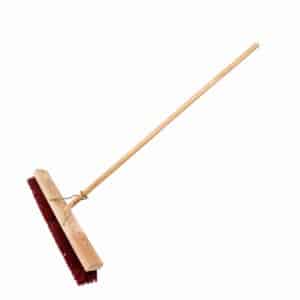 There are many types of brushes and brooms on the market today. Some are commonplace in homes and businesses, like straw brooms and deck brushes, but others are more specialized for larger projects or business-related applications.
There are many types of brushes and brooms on the market today. Some are commonplace in homes and businesses, like straw brooms and deck brushes, but others are more specialized for larger projects or business-related applications.
While many employees just grab a broom without a second thought, choosing the best broom or brush for the job can take less time, increase efficiency and produce better overall results.
In addition, if your company purchases brooms and brushes frequently, choosing the right one can also favorably impact the business’ bottom line by requiring fewer replacements.
There is overwhelming number of choices in the marketplace today: Deck brushes, vehicle brushes, scrub brushes, push brooms, street brooms, carpet sweepers and counter brushes to name a few. All of these materials come in different sizes as well with varying ranges of brush thickness, length and materials.
So, how do you pick the perfect brush or broom for your employees and business? Read on to learn everything you need to know about the different types of brushes and brooms and the benefits of each:
Know the materials. Before you can decide on the most appropriate brush or broom, you need to consider the type of tasks your employees will be using them for. This is probably the most important step to considering a specific type of product because the type of bristles in the brush will be a determining factor based on their absorbency, durability and scratch-resistant qualities.
A deck brush, for example, is able to come in contact with liquid. These are often used in conjunction with a mop and bucket as well as floor cleaners, detergents and solvents to get a surface clean. Because of this, they won’t curl or mat after being submerged.
Truck wash brushes are more appropriate for cleaning vehicles because their soft bristle ends are gentle enough not to scratch auto exteriors or paint, but powerful enough to dispose of road salt, grime and ground-in dirt. Meanwhile, the durable plastic blocks the bristles are mounted on are able to hold up in the toughest vehicle environments, including repair shops, garages, warehouses, docks, car washes and shipyards.
Scrub brushes, on the other hand, are often the best choice for scrubbing baseboards, food service floors and restroom tile. They also work great cleaning debris up from underneath tables. Ideal for heavy-duty scrubbing chores, scrub brushes are commonly lightweight and constructed from polypropylene bristles to hold up well in wet applications.
Tampico bristles are made from natural vegetable fibers so brushes and brooms made from these bristles work well in multi-purpose jobs where working with water is necessary. These are also highly resistant to heat, alkali, solvents and acid.
Consider the task. Different jobs call for different types of brooms and brushes. It would be a mistake to use a push broom for light indoor cleanup work, for example. Push brooms have long, wide brushes designed for handling heavy dirt on concrete and texturally rough floors while smaller household brooms are better designed for light interior dirt and messes.
When deciding on a new brush or broom, consider the size of the product, the amount of strength needed to use, its length and width (important for storage concerns), comfort (employees will clean up more if the brush or broom doesn’t leave them nursing blisters) and scope of the handle. To wipe debris clean under restaurant tables or booths, for example, you’ll need a longer handle to reach. However, for quick counter cleanup, you’ll need a shorter, handheld version.
Get a handle on things. Think about the grip you need, comfort and durability. Some brushes are made to use with your choice of handles, but not all handles are as durable as the brush itself. Make sure the two are a good match.
Also look for a heavily lacquered handle that will resist cracking and last longer, an ergonomic design that adds to the ease of use and a textured grip that will make the broom easier to control.






A question for anyone who knows:
I’m using plastic-bristle brooms and brushes for household cleaning
and I find that clumps of dust, dirt, hairs (ppl and pets alike), & such
wind up clinging to the bristles and not saying on the floor where they can be panned up.
So I have to either step on them to clear them off, or take them off by hand.
Would natural straw fibers be less likely to grab the dust bunnies, and more likely to leave them on the floor where they belong?
Thanx in advance for any input.
I think this is a problem with all bristle types actually 🙁